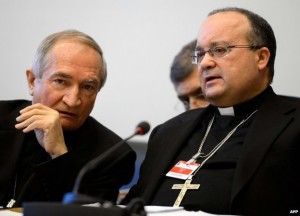
By Sarah Mac Donald - 17 January, 2014
 The Vatican’s representative in Geneva, Archbishop Silvano Tomasi, has defended the Holy See’s handling of allegations of clerical child sexual abuse before a UN committee and denied that it was intent on a cover up.
The Vatican’s representative in Geneva, Archbishop Silvano Tomasi, has defended the Holy See’s handling of allegations of clerical child sexual abuse before a UN committee and denied that it was intent on a cover up.
The delegation sought to account for the Church’s handling of clerical abuse as Pope Francis in Rome told pilgrims on Thursday that though the abuse scandals had “cost us a lot of money” paying damages to the victims of these crimes was “only right.”
The Pontiff also said bishops, priests and lay people were responsible for this “shame of the Church”.
Meanwhile, in Geneva, Archbishop Tomasi gave his testimony as head of the Holy See’s delegation which was called before the Implementation Committee of the Convention on the Rights of the Child.
The five-member delegation also included Bishop Charles Scicluna from Malta, who acted at the Vatican’s prosecutor in abuse cases for ten years.
In his testimony, Archbishop Tomasi said the Vatican could not be held responsible for the actions of priests in the way that an employer is, because the nature of the relationship between the Church and its priests was different.
He argued that as a result, the Vatican State could not be held to account for what’s done outside its borders.
The UN hearing was the first time the Vatican has publicly had to account for its handling of allegations of abuse by priests around the world.
Speaking to Vatican Radio afterwards, Bishop Scicluna described the UN committee’s questioning as “gruelling.”
He said he hoped the responses of the delegation had provided the public with answers.
He also reiterated his view that local governments are responsible for prosecuting criminal activities within their jurisdiction.
Speaking to the UN panel, the Maltese prelate stated, “The Holy See gets it, that certain things have to be done differently.”
He told the UN committee, “It’s not words, it has to be commitment on the ground, on the level of the local churches.”
In his prepared statement to the UN committee, Archbishop Tomasi said that the Holy See “has formulated guidelines to facilitate the work of the local churches to develop effective measures within their jurisdiction and in conformity with canonical legislation.”
“In the end … such crimes can never be justified, whether committed in the home, in schools, in community and sports programmes, or in religious organisations and structures,”Archbishop Tomasi said.
UN committee member, Kirsten Sandberg, criticised the Vatican’s procedures as “not very transparent” perhaps frustrated by the delegation’s reiteration of its defence that the Holy See does not directly control the policies of individual dioceses.
The UN committee is expected to issue recommendations in relation to the Vatican’s compliance with the Convention on the Rights of the Church, to which it is a signatory. However, the UN committee does not have enforcement powers.